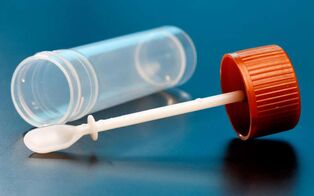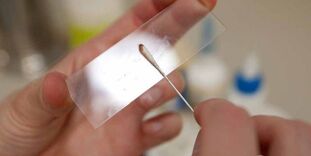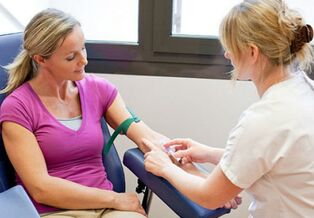What tests do you need to do to identify worms?
Tests for worms should be performed regularly to detect the disease in a timely manner. The most popular of these is a stool test before going to work or a sanatorium, but it is not the only and most reliable way to identify parasites. The most accurate answer will be given by a combination of tests.
What tests are available for worms
The list of tests that need to be performed to identify parasites is very long.
The main ones are:
- Fecal analysis, also known as worm eggs, is the most common method. Advantages - mass use, no need for complex equipment. Minus - lack of accuracy;
- ELISA, a blood test for worms. Pros - high accuracy. Cons - reveals only certain stages of parasite development, at other times the result will be questionable;
- Analysis of other biological environment (urine, sputum, duodenum, epidermis). Pros - allows you to identify parasites that are inaccessible to other analyzes in other localizations. Cons - associated with a significant concern for the patient.
Typically, the patient is prescribed a combination of several tests to identify the parasite. The recovery criterion is a negative ELISA result and several negative results from a study of the biological environment in which the worms were found.
Fecal analysis for worm eggs
Most worms live in the intestines, so the most common test for worms is a stool test. At the time of hospitalization, routine medical examinations for adults and children are scheduled before being sent to a sanatorium or children's camp as part of a health book. In addition, this test is performed by people who come in contact with infected patients, eat untested foods, and report signs of worms.

No special preparation is required for analysis, you can collect feces at any time of the day, but the most common indicator is morning feces. Immediately before birth, the perineum should be washed to prevent urinary impurities and discharge from the genitals.
For worms, feces are collected in a special container for analysis. It is sealed and a special spoon is added to collect the outfit. To collect the most informed part of the material, you should take a sample from the middle of a piece of feces. About a third of the container needs to be filled. You must deliver to the laboratory on the same day.
In the laboratory, a specialist examines the feces under a microscope and identifies the eggs of the worms inside. Most of them have a characteristic shape that allows you to accurately determine the type of worm. Based on the results of the analysis, a conclusion is drawn about the absence of eggs or their presence and type, after which treatment is prescribed.
This is the most common, but least accurate worm test. The reason may be that there are no eggs in the cocoon, despite the presence of worms. Therefore, if the patient complains of characteristic symptoms or comes into contact with the source of infection, 5-6 tests are required every 2-3 days. In this case, the probability of detection of parasites increases significantly. Other diagnostic procedures are prescribed in conjunction with stool examination.
My itchy skin

This test generally completes the stool test. The most accurate result is obtained when diagnosed with pinworms that lay eggs on the surface of the skin near the anus. Indications for such an analysis are daily examination of children and adults, enrollment in a kindergarten, school, camp or sanatorium, hospitalization of children and adults, suspicion of pinworm infection (itching in the anus, indigestion, contact with sick people). Often children suffer from this disease, which explains the name of the worm (child pinworm).
There is no need to prepare for the analysis of worms, you should not wash the perineum - so it is possible to wash the eggs of parasites, you should avoid bathing or showering the night before. The analysis is performed in the morning. A special film is used to collect material from the skin of the interguteal layer. The study is also performed under a microscope. Does not detect other helminthiases except pinworms.
Urine analysis
This test is the least prescribed because the parasites live in almost no urine. The situation is possible when pinworms are detected in the urine analysis, but this indicates a violation of the rules of analysis - parasites and their eggs enter the container through the skin of the perineum. This condition is more common in girls and less common in boys.
But there are still signs for testing. Some tropical parasites live in the kidneys and urinary tract, which is "rewarded" by a person's trip to the resorts of Asia and Africa. With the increase in the availability of exotic recreation areas, the spread of parasites that are not typical for our country is also increasing. For this reason, it is advisable to perform a urine and blood test for worms after a trip to the resort.
Types of worms found in urine:
- Trichomonas;
- Distomum haematobium;
- Filaria sanguinis hominis;
- Taqnia echinococcus.
Urine may also contain eggs of liver parasites - echinococcus and flukes.
Sputum analysis
There are a number of parasites that spend all or part of their lives in the lungs. The symptomatology of their appearance is not typical - catarrhal phenomena develop in the bronchi (inflammation, cough, wheezing). Hemoptysis, pneumonia of unknown origin, and other events from the lungs may be noted.
Parasites detected by sputum worm test:
- Ascaris - need oxygen in the larval stage;
- Echinococci and alveococci are tissue parasites that live in parenchymal organs, including the lungs;
- Dwarf fluke - lives mainly in the lungs;
- Strongiloidosis, noncatorosis - parasitosis characterized by intestinal localization, located atypically in the lungs.
No special preparation is required to collect sputum, but it is advisable to brush your teeth and pick up material in the morning. Before that, it is useful to drink plenty of fluids - it improves the secretion of mucus. The collection container should be clean, but not necessarily sterile - bacteria do not play a role in the diagnosis. In this case, both the parasites themselves and the eggs are detected. If the patient is unable to cough up sputum, it is removed from the trachea by vacuum suction.
For worms, it is possible to use drugs that improve the secretion of sputum and stimulate its formation to obtain more accurate results of the analysis. Gives very accurate results in combination with a blood test for worms. Unlike the stool test, eggs are more common.
Blood test

An ELISA or blood test for worms is the most accurate way to identify them. Helminths cause a strong reaction from the immune system - the number of eosinophilic leukocytes increases, the production of immunoglobulins increases and specific antibodies against parasites appear. The construction of the ELISA method is their detection.
Antibodies to parasites are extremely specific - they can be unambiguously diagnosed only in the presence of parasites in the blood and within 3 weeks after their disappearance.
Intravenous blood is required for analysis. No special training required. The result can be achieved within two days. The accuracy is close to 100%, the specificity of the antibodies does not allow a wrong result. The criterion for recovery is a negative result one month after treatment.
Analysis of the composition of the duodenum
The bile ducts and pancreatic ducts open into the duodenum. These organs are often affected by echinococcosis and opisthorchiasis. Parasites lay eggs that pass from the ducts to the intestines. The analysis method for worms in the duodenum allows to identify these diseases more accurately than fecal analysis.
The material is taken on an empty stomach with a duodenal probe. If the patient has a clear intestinal reflex, painkillers are applied. The procedure is very unpleasant, so it is applied only in cases where the results of other examinations are in doubt.
When to check for worms
Tests for worms should be performed in the following cases:
- The patient is experiencing symptoms of a helminth infection;
- The patient was in contact with sources of infection (sick people, untested products, areas with unfavorable sanitary conditions);
- Confirmation is required that the patient is not a source of infection (work, health records, out-of-town rest, hospitalization).
How to check for worms

You should consult your doctor to get tested for worms. Most examinations do not require preparation, and if there are nuances, the doctor will explain them when prescribing a case. Indications are required for a doctor to write an appeal.
In commercial clinics, you can get an analysis, regardless of the indication. The price varies considerably. The time to get the results of feces and crumbs is about a week, depending on the workload of the laboratory, urine, sputum, blood analysis is about 2 days.
What helminths can be detected using tests
Analysis for worms allows to identify the most common types of parasites - intestinal and extra-intestinal forms. Rather, it is a blood test for worms that allows the parasite to be identified.
















































